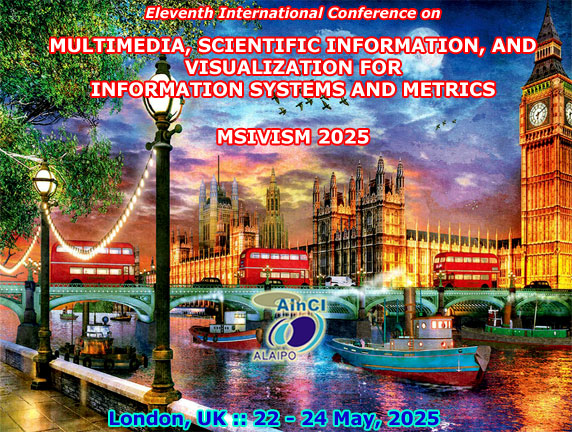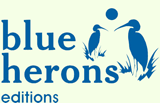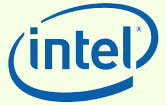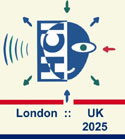Eleventh International Conference on
Multimedia, Scientific Information, and Visualization for Information Systems and Metrics
( MSIVISM 2025 )
:: London – UK ::
May 22 – 24, 2025
| Home |
| Topics |
| Important Dates |
| Paper Submission |
| Organization |
| Program |
| Registration |
| Publications |
::. CNR - IMM .::
National Research Council
Italy
::. FUN .::
Future University Hakodate
Japan
::. GIVE .::
Globally Integrated Village Environment Research
Austria
::. HAN .::
HAN University of Applied Sciences
the Netherlands
::. IIMROHTAK .::
Indian Institute of Management Rohtak
India
::. ITB .::
Institute of Technology Bandung
Indonesia
::. KETTERING .::
Kettering University
USA
::. MCU .::
Ming Chuan University
Taiwan
::. METU .::
Middle East Technical University
Turkey
::. MJU .::
Myongji University
South Korea
::. MSU .::
Moscow State University
Russia
::. NNI .::
National Institute of Informatics
Japan
::. NNU .::
National United University
Taiwan
::. NYU .::
New York University
USA
::. POLSL .::
Politechnika Slaska University
Poland
::. OU .::
The Open University
UK
::. PRC .::
Perspective Research Centre
UK
::. PURDUE .::
Purdue University
USA
::. TSINGHUA .::
Tsinghua University
China
::. TUDELFT .::
Delft University of Technology
the Netherlands
::. U-AIZU .::
University of Aizu
Japan
::. UB .::
"Vasile Alecsandri" University of Bacău
Romania
::. UBA .::
University of Buenos Aires
Argentina
::. UCC .::
University College Cork
Ireland
::. UCL .::
University College London
UK
::. UCR .::
University of Costa Rica
Costa Rica
::. UEF .::
University of Eastern Finland
Finland
::. UHK .::
University of Hong Kong
China
::. UIOWA .::
University of Iowa
USA
::. UM .::
University of Malta
Malta
::. UMD .::
University of Michigan-Dearborn
USA
::. UNAM .::
National Autonomous University of Mexico
Mexico
::. UNC .::
National University of Córdoba
Argentina
::. UNCU .::
National University of Cuyo
Argentina
::. UNED .::
Universidad Nacional de Educación a Distancia
Spain
::. UNIBO .::
University of Bologna
Italy
::. UNIGE .::
University ofi Genova
Italy
::. UNILJ .::
University of Ljubljana
Slovenia
::. UNIROMA2 .::
University of Rome Tor Vergata
Italy
::. UNSW .::
University of New South Wales
Australia
::. UofO .::
University of Ottawa
Canada
::. UOI .::
University of Ioannina
Greece
::. UPR .::
University ofPuerto Rico
Puerto Rico
::. US .::
University of Sevilla
Spain
::. USC .::
University of Southern California
USA
::. UWI .::
University of the West Indies
Jamaica
::. WASEDA .::
Waseda University
Japan
::. WSU .::
Wayne State University
USA
HOME |
|
Topics, Deadlines and Program Committee 1. Topics Measurement is a fundamental activity in the advancement of the sciences. Historically, civilizations have contributed a myriad of knowledge stemming from the discoveries and inventions of scientists, and in order to perfect such results, the names and studies of those savants are part of the scientific cultural wealth of all humankind; and so they have been carefully recorded in the annuals of history ever since the earliest origins of the human endeavor to know more. In the 20th century the global village foreseen by Marshall McLuhan generated a kind of vital epicenter, but at the same time it was a source of conflicts and especially in relation to subjects such as the quality of metrics that are used to measure progress in the spaces that exist between the interrelations of the various different subject disciplines. It is easy to detect how in the 21st century many detractors of the measurement of the quality of the interactive systems resorted to a myriad of ploys to play down the importance that exists in the intersection between the factual, formal and natural sciences and also the humanities and/or new technologies of information and communication. Today, it would be relatively easy to analyse the mistakes of those who at the end of the 20th century saw the multimedia as a union of media, when in reality it is an intersection of the same. This intersection was easily detectable by the communication professionals, from the social point of view, for instance. However, initially that crossroads was rejected from the computer science perspective. By way of example, for a large part of the last decade of the past century overlapping concepts were ignored, especially when the issues concerning multimedia communications and the measurement of the quality of the communicative process among human beings through computers were approached. in few words, that denial derived from a lack of training and/or experience of what should have been a 360 degree vista between the factual, formal and natural sciences. Actually, such a holistic vision mustn't be understood simply as synonymous with of interdisciplinary study, but rather as a balance between theories and practices of the factual, formal and natural sciences. The current space intends to locate that balance among amongst all of the components of the multimedia / emerging new interactive systems, including their variables and also their relationships, from the point of view of software quality as well as the point of view of hardware efficiency. It is a context where scientific information occupies a predominant place and around it we find many of the key elements for the current and also future trends in the quality and communicational / informative / formative systems as a whole. In this field the details of the informative systems, especially aimed at multimedia / emerging interactive systems and technologies; scientific visualization; content of scientific information; extended reality; amongst so many other issues related to computer science; computer graphics & animation; software / systems / telecommunications / electronics / artificial intelligence / robotics engineering; quality assessment; heuristics methods; etc., are all studied in detail. In other words, these are the fundamental issues that we all will have to approach on a daily basis as future professionals of the informative systems, and as we embark on a journey towards a new era: “Quantic-nanotechnological-self-sufficient era.” All contributions –papers, research-in-progress, workshops, demos, posters, doctoral consortium, and so on, should be of high quality, originality and significance. In the current international conference it is demonstrated how with a correct integration among professionals of factual, formal and natural sciences interesting research lines in the following subjects: 3D, AI, APPs Programming, Interfaces, Augmented Reality, Computer Graphics, Computer Vision, Educational Assessment, Human and Social Factors, Interaction, Communicablity, Design, Emerging Interactive Technologies, HRI, ICT, Information Management, Metrics, Methods / Techniques / Tool for Heuristic Evaluation, Mobile Computing, Telecommunication, Multimedia / New Interactive Systems, Quality Evaluation, Networking, Scientific Information and Informatics, Software / Systems / Usability / UX / Web / AI ... Engineering, and other computational areas are solicited on, but not limited to (alphabetical order): Design and Interactive Communication
Multimedia Systems and ICT
Computer Science, Scientific Information and Visualization
Knowledge, Software Quality and Global Village
A special clarification: Many conferences are focussed on specific aspects of 3D modeling, computational geometry, computational photography, computer science, computer-children interaction, computer-robotics interaction, ecosystems, heuristic evaluation, image processing, interfaces, machine learning, medical information, retrieval information, recommender systems, user interface design, and so forth, and bring together leading experts in a particular field or sometimes on a specific technology. At such large conferences students are often marginalized or relegated to poster sessions with only 5 – 10 minutes for the presentation, for example. The conferences, workshops, symposiums, and so forth, are not a big scale (thousands) and aim to promote dialogue between established professors and graduate students working on new research directions. Besides, we are working with zero Gardunia Factor (G Factor). Last year’s symposia, workshops, conferences, parallel sessions, and so on, organized by ALAIPO and AInCI, for instance, included papers, posters, demos, work-in-progress, etc., on the topics (see above the alphabetical order). An extensive listing connotes and reflects the requirement and also skill necessary to find intersection zones of the disciplines among the different domains, fields, and specialities; which at the same time potentially boosts and merges the formerly different scientific views. Furthermore, all submitted research works will be reviewed by a double-blind (at least three reviewers), non-blind, and participative peer review. These three kinds of review will support the selection process of those that will be accepted for their presentation at the international conference. Authors of accepted papers who registered in the conference can have access to the evaluations and possible feedback provided by the reviewers who recommended the acceptance of their contributions, so they can accordingly improve the final version of their works. This is an international conference “100% in-person.” Best regards, Francisco V. Cipolla Ficarra (Chair – coordinator) ALAIPO: Asociación Latina Interacción Persona-Ordenador –Latin Association of HCI (www.alaipo.com) and AINCI: Asociación Internacional de la Comunicación Interactiva –International Association of Interactive Communication (www.ainci.com). Address: Via Tabajani 1, S. 15 (7) - 24121 (Bergamo) Italy :: c/ Angel Baixeras, 5 - AP 1638 - 08080 (Barcelona), Spain. Email: info@alaipo.com :: info@ainci.com P.S. If you wish to be removed from this mailing list, please send an email to info@ainci.com or info@alaipo.com with "remove" in the subject line. Thanks.
2. The conference have the following deadlines Works Submissions: Closed. Consequently, as they are received, they will be evaluated. It is a way to speed up the process to make up the final program of the international conference, visa requirements, should plan travel well in advance, and so on. In other words, it is not necessary to wait until the deadline to send them for the evaluation process. Deadline Works Submissions: April, 21th –local time in Hawaiian Islands :: Closed
3. Program Committee: :: Francisco V. Cipolla Ficarra (chair – coordinator) Demo Session, Poster Session, Workshop Session, and Doctoral Consortium: :: Alan Radley, Perspective Research Centre and University College London (UK), Giulia Mancini. University of Rome Tor Vergata (Italy), and Miguel C. Ficarra. AInCI, ALAIPO and FMF (Spain and Italy). Honorary Committee: :: Alan Radley. Perspective Research Centre and University College London (UK) Scientific, Steering and Technical Committees :: Alan Radley. Perspective Research Centre and University College London (UK)
|
|
| © 1997 - 2025 AINCI & HCI Lab | ||||
|---|---|---|---|---|































